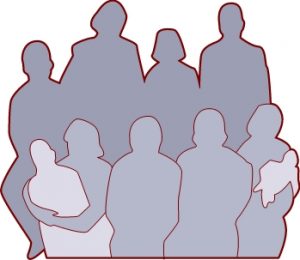For September 27, 2020
The evening when our Lord instituted the Lord’s Supper has always been fascinating in many ways. What was He thinking and feeling? What were His Disciples thinking and feeling? The Bible provides a brief commentary on our Lord’s contemplation that evening,
You see, at just the right time, when we  were still powerless, Christ died for the ungodly. Very rarely will anyone die for a righteous person, though for a good person someone might possibly dare to die. But, God demonstrates His own love for us in this: While we were still sinners, Christ died for us (Romans 5:6-8 NIV).
were still powerless, Christ died for the ungodly. Very rarely will anyone die for a righteous person, though for a good person someone might possibly dare to die. But, God demonstrates His own love for us in this: While we were still sinners, Christ died for us (Romans 5:6-8 NIV).
The first Adam’s disobedience brought sin into God’s perfect, world—and death because of his sin—for all have sinned (Romans 5:14). Since all have sinned, all of our “good deeds” are sin-polluted, which leaves us with a severe righteousness deficiency before God.
A splendid illustration would be if one carried a fountain pen in the breast pocket of their white dress shirt. More often than not, the ink pen would leak, and the slightest ink spot on the white shirt stained the shirt—sometimes permanently.
As the ink spot polluted the shirt, sin has polluted our righteousness. On our best day, we are still worthless before a holy God (who has never been polluted), and we fail before His righteousness as filthy rags,
We are all infected and impure with sin. When we display our righteous deeds, they are nothing but filthy rags. Like autumn leaves, we wither and fall, and our sins sweep us away like the wind (Isaiah 64:6 NLT).
However, this is not the case with Jesus Christ. He was without sin and was fully aware His death would redeem all fallen humanity from sin and restore us to a loving, eternal fellowship with God,
Therefore, as through one man’s offense judgment came to all men, resulting in condemnation, even so through one Man’s righteous act the free gift came to all men, resulting in justification of life. For as by one man’s disobedience many were made sinners, so also by One Man’s obedience many will be made righteous (Romans 5:18-19 NKJV).
It is truly unbelievable how Jesus freely chose to offer Himself to redeem the entire world; whether Jew, gentile (non-Jew), believer, non-believer, rich, poor, black, white, brown, red, yellow, etc. All of us can vicariously receive the full benefit of His perfect sacrifice—without preference or distinction.
Ultimately, Jesus chose to redeem those who love Him, and those who hate Him, those who believe in Him, and those who do not believe in Him completely and without reservation. But we must choose Him,
Seek the Lord while He may be found; call on Him while He is near. Let the wicked forsake their ways and the unrighteous their thoughts. Let them turn to the Lord, and He will have mercy on them, and to our God, for He will freely pardon (Isaiah 55:6-7 NIV).
No one wants to live in a world that celebrates and embraces sin, licentiousness, bigotry, hatred, anarchy, and violence as part of its normal course of operations, as our fallen world does today.
Faith in Jesus Christ guarantees that the powers of Satan, sin, and death do not bind us. For in Him, we have been set free to enjoy His peace, love, and joy forever in the company of other Believers with our God.
Thus, from this day forward, it is our turning from sin through repentance, and turning to Christ by faith that yields true abundant living. In other words, it is our faith in Jesus’ perfect work that determines our righteousness (or lack thereof) before our holy, and righteous God to yield His eternal favor and blessing.
Jesus Christ is the answer for the life and the hope you are seeking today. Won’t you trust Him now?
What a wonderful Savior!


 In other words, we have no need for Jesus Christ, God, or the Bible—we are all we will ever need! Biblically centered ideals, which contrast the “everything is relative” and “everyone is right” narrative remain censored or ignored in a flawed “utopia” where hostility, disrespect, and violence have replaced common courtesy, respect, and decency.
In other words, we have no need for Jesus Christ, God, or the Bible—we are all we will ever need! Biblically centered ideals, which contrast the “everything is relative” and “everyone is right” narrative remain censored or ignored in a flawed “utopia” where hostility, disrespect, and violence have replaced common courtesy, respect, and decency. Prophets hang on these two commandments
Prophets hang on these two commandments I am praying not only for these disciples but also for all who will ever believe in me through their message. I pray that they will all be one, just as you and I are one—as you are in me, Father, and I am in you. And may they be in us so that the world will believe you sent me. I have given them the glory you gave me, so they may be one as we are one. I am in them and you are in me. May they experience such perfect unity that the world will know that you sent me and that you love them as much as you love me. Father, I want these whom you have given me to be with me where I am. Then they can see all the glory you gave me because you loved me even before the world began! “O righteous Father, the world doesn’t know you, but I do; and these disciples know you sent me. I have revealed you to them, and I will continue to do so. Then your love for me will be in them, and I will be in them
I am praying not only for these disciples but also for all who will ever believe in me through their message. I pray that they will all be one, just as you and I are one—as you are in me, Father, and I am in you. And may they be in us so that the world will believe you sent me. I have given them the glory you gave me, so they may be one as we are one. I am in them and you are in me. May they experience such perfect unity that the world will know that you sent me and that you love them as much as you love me. Father, I want these whom you have given me to be with me where I am. Then they can see all the glory you gave me because you loved me even before the world began! “O righteous Father, the world doesn’t know you, but I do; and these disciples know you sent me. I have revealed you to them, and I will continue to do so. Then your love for me will be in them, and I will be in them has promised everlasting communion with both He, and the Father through the Spirit. Before going to the cross, He comforts us with His promise to return,
has promised everlasting communion with both He, and the Father through the Spirit. Before going to the cross, He comforts us with His promise to return,